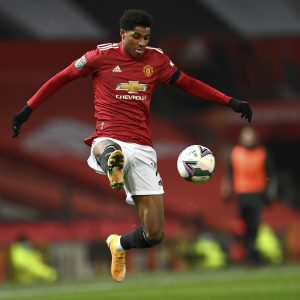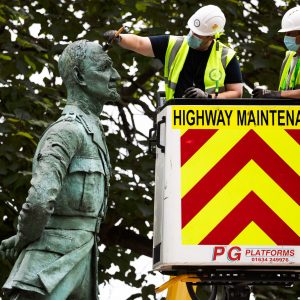A win bigger than the Euro cup?
England’s diverse and socially aware team stood in stark contrast to the football hooligans who stormed Wembley and the bigots who hurled racist insults at three Black players.
Author:
16 July 2021

Less than an hour had passed between England’s defeat in the 2020 Uefa European Championship final and the vandalisation of a mural depicting Marcus Rashford near his childhood home in Manchester. Rashford was one of three English players, along with Jadon Sancho and Bukayo Saka, to fire a blank in the decisive penalty shootout against Italy at Wembley. All three received a torrent of racist abuse on social media as a result.
Trying to make sense of what football and this current crop of players mean to English society is like standing in the centre of a hall of mirrors. Everything is distorted and reflected at odd angles. The images shift depending on your vantage point. Stay too long and you’re likely going to feel a little dizzy.
If anything, Gareth Southgate’s team has exposed an underlying hypocrisy in English culture. More than one social commentator pointed out that had Rashford, Sancho and Saka – aged 23, 21 and 19 respectively – slotted home their penalties, they would have been heralded as heroes by the same people who called them monkeys and posted emojis of bananas on their Instagram feeds.
Even if they had won, it was always too much to expect this young group to unite the country. Sporting glories are hollow and fleeting. They offer the sense of social change but rarely prove to be a catalyst for meaningful recalibration. Three Rugby World Cup victories from the Springboks have done little to address the inequities in the most unequal country on record. Had England’s brave lions triumphed under the Wembley arch, they would have simply applied a veneer of harmony over a disharmonious ecosystem – one ripped apart by years of austerity, Britain’s shrinking status in global affairs, Brexit and a raging culture war.
Related article:
But that’s all politics. What this team has done is cut through the unpalatable noise to engage with fans as people, not as potential voters or consumers of a product. Midfielder Jordan Henderson has been a vocal ally of the LGBTQIA+ community, wearing rainbow laces and declaring publicly that the beautiful game is for everyone, no matter who they love. The Liverpool skipper also led a consortium of Premier League captains to speak out against the proposed European Super League that would have gutted club football on the continent.
Then there is Rashford. A young man barely out of boyhood who has transcended the confines of his sport like few athletes in history. By drawing on his own experience with hunger, he led a campaign last July that forced a government U-turn to ensure hungry children received free school meals. He used his platform to legitimately change the world around him, not through magical moments with a ball at his feet but through a concerted declaration that no child in this wealthy nation should go to sleep with an empty stomach.
That he did so indicates a broader malaise. The United Kingdom is the sixth-richest country on Earth and yet more than 2.5 million people relied on food banks this past year. It is not for Rashford to point out that this is inherently wrong, that this is patently a sign of a brittle social order. It is for the country’s leaders to address this imbalance. Failing to do so is the result of either a lack of will or ability. If this ruling Conservative Party was held to the same standards as a football club, its leaders would have got the sack long ago.
Boris and Patel hypocrisy
From his refusal to acknowledge the severity of the coronavirus pandemic to his bloviating rants about British exceptionalism, Prime Minister Boris Johnson has stood in almost direct contrast to the ideals of this football team. Not that it has stopped him from hitching a ride on the bandwagon, arranging staged photos where he cheers awkwardly at a television while wearing the team’s white kit.
In the wake of the racist abuse levelled at the three young Black players, Johnson issued a scathing rebuke, instructing those responsible to “crawl back under the rock from which [they had] emerged”. This is the same Johnson who once described Africans as “flag-waving piccaninnies” with “watermelon smiles” and likened Muslim women in burkas to “letterboxes”.
Johnson’s Home Secretary Priti Patel, whose tough anti-immigration and detention policies have made her a powerful and terrifying force in Whitehall, also criticised the racist posts on social media, saying that she was “disgusted” by them. However, Patel was an outspoken critic of the Black Lives Matter protests. She said that the decision by England’s footballers to kneel prior to kickoff was “dreadful” and that fans had the right to boo them.
England defender Tyrone Mings lambasted Patel’s blatant hypocrisy: “You don’t get to stoke the fire at the beginning of the tournament by labelling our anti-discrimination message as ‘gesture politics’ and then pretend to be disgusted when the very thing we’re campaigning against, happens.”
Related article:
This collision of sport and politics – with athletes and politicians standing as diametrically opposed foes – is not new. But rarely does such a high-profile team hold those in power to account with such cohesion. Southgate and captain Harry Kane have ignored the accusations that their anti-racist stance is somehow a Marxist stunt – as if these millionaire footballers were socialist revolutionaries – and have risked alienating a portion of their own fanbase to shine a light on the most toxic aspects of their society.
Some South African sports teams could learn from this England football side. Though there have been champions such as Siya Kolisi, Makazole Mapimpi, Lungisani Ngidi and Rassie van der Dussen, a collective voice has been absent, stoking the impression that the Springboks and Proteas are as divided as the nation they serve.
“This [England football] team is able to stand up for these causes – feeding kids, refusing to bend to the will of a racist government, standing up for inclusivity – because they have all experienced these challenges in one way or another,” says Vithushan Ehantharajah, sports feature writer for the Independent digital newspaper. “A lot of them are from working-class backgrounds and so when they speak about struggle, they’re speaking from experience. When they speak about racism they understand how damaging that can be at an individual as well as on a societal level.
“Even the middle-class players, and the white players, they’ve shared a field with enough people who do not have the same privileges they have. Cricket and rugby in this country – the same as it is in South Africa – are sports that are still largely enjoyed and played by the middle class. Football is enjoyed by everyone. Many of the players who have made it to the top have lived on the front line of these social challenges. They’re not pretending when they take a knee and they’re not reaching when they say that Black lives matter.”
The good and bad of England
Even so, the consciously ignorant have twisted the actions and words of the players. Nigel Farage, the odious snake-oil salesman whose lies helped fuel the Brexit campaign, said Southgate was “out of touch with England fans” because of the manager’s support of his players’ decision to take the knee.
Farage and others like him have refused to accept the players’ assertions that their actions – which have become ubiquitous in sport around the world since American footballer Colin Kaepernick kneeled in August 2016 – are nothing more than a call for racial unity. Right-wing politicians aren’t interested in what the players have to say. They have overtly co-opted an inclusive and powerful message for their own gain through dog whistles and incendiary remarks.
A brief word on England’s fans. If this team of likeable individuals pulling in a single direction represents the best of this country, then a large group of its supposed supporters unquestionably represents its worst aspects. For decades travelling fans have occupied town squares and high streets in some of Europe’s most famous and beautiful cities. From Prague to Nice, Amsterdam to Porto, pink-skinned hyper-boozed hooligans trashing restaurants and cafes while chanting xenophobic songs have become indelibly linked with England’s teams abroad.
This time, English hooliganism turned on England. On the day of the final, the areas around Wembley resembled a war zone. Social media was awash with videos of “lads” snorting cocaine, hurling bottles through the air and attacking security guards. Multiple fans stormed the gates of the stadium, forcing their way in. It is too simplistic to say that these hooligans typify English football fandom, but then it would be amiss to dismiss them as a small minority. This is England, at least a sizeable portion of it.
Related article:
But if they are England, then so too is this football team and those who stand behind their calls for change. Everything that is good about this former coloniser – creativity, inclusion, talent, hope – is embodied within it. They are everything that proponents of Johnson and Farage hate.
If there was any doubt, consider that the inflammatory graffiti scrawled over Rashford’s mural was hastily covered up. Not long after some anonymous coward desecrated a monument to a hero who fed hungry children, the people of Manchester showed that love will always beat hate.
Hundreds of messages of support were soon plastered on the wall. Images of hearts and raised fists, as well as poems and simple phrases expressing gratitude took the place of ugly abuse.
What does this football team mean to England? It is England, in all its glory and shame. They may not have ended their drought of a major tournament win for 55 years, but they shifted the discourse on how a nation speaks about sport and its place in society. Some might say this is more important than silverware.



